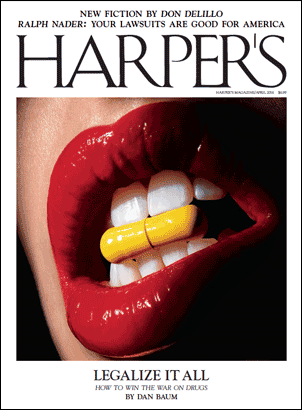Introducing the April Issue
Dan Baum, Ralph Nader, Thomas Frank, Don DeLillo, Robert P. Baird, Emily Witt, and more
 It’s a truth almost universally acknowledged that America’s war on drugs failed spectacularly. Why then, Dan Baum asks in his cover story for the April issue, “did the United States entangle itself in a policy of drug prohibition that has yielded so much misery and so few good results?” It was not until speaking to Richard Nixon’s domestic policy adviser, John Ehrlichman, that Baum began to hazard the answer he long feared: the catastrophic collateral wrought by the drug war on the lives of millions of black families was intentional. “Did we know we were lying about the drugs?” Ehrlichman told Baum in 1994. “Of course we did.” The Nixon White House thought of the antiwar left and black people as enemies. “But by getting the public to associate the hippies with marijuana and blacks with heroin, and then criminalizing both heavily, we could disrupt those communities.” Fast forward two decades, however, and it’s clear that the country’s mood has changed. To date, twenty-three states have legalized medical marijuana. The question is no longer whether we should legalize drugs but how. “If we can summon the political will,” Baum writes, “the opportunity to establish state monopoly of drug distribution,” as we did with alcohol distribution in the 1930s, is now.
It’s a truth almost universally acknowledged that America’s war on drugs failed spectacularly. Why then, Dan Baum asks in his cover story for the April issue, “did the United States entangle itself in a policy of drug prohibition that has yielded so much misery and so few good results?” It was not until speaking to Richard Nixon’s domestic policy adviser, John Ehrlichman, that Baum began to hazard the answer he long feared: the catastrophic collateral wrought by the drug war on the lives of millions of black families was intentional. “Did we know we were lying about the drugs?” Ehrlichman told Baum in 1994. “Of course we did.” The Nixon White House thought of the antiwar left and black people as enemies. “But by getting the public to associate the hippies with marijuana and blacks with heroin, and then criminalizing both heavily, we could disrupt those communities.” Fast forward two decades, however, and it’s clear that the country’s mood has changed. To date, twenty-three states have legalized medical marijuana. The question is no longer whether we should legalize drugs but how. “If we can summon the political will,” Baum writes, “the opportunity to establish state monopoly of drug distribution,” as we did with alcohol distribution in the 1930s, is now.
In his essay on U.S. tort law, Ralph Nader examines the ways in which lobbyists have chipped away at what he calls the country’s “revolutionary process of personal-conflict resolution.” Corporate law firms, Nader writes, “now busily sound false alarms about the ever-expanding number of tort cases being brought by ‘greedy attorneys.’” What these claims fail to acknowledge, however, is that tort-law depositions unearth incriminating evidence against those at the uppermost reaches of the corporate ladder, often leading to criminal prosecutions. When the protections of tort law are circumvented, weakened, or nullified altogether, Nader concludes, it undermines the right of all citizens to protect themselves from harm caused by greedy manufacturers and to have their day in court.
In this month’s Folio, Harper’s Magazine’s managing editor Robert P. Baird tells the story of Jay Miscovich, a fifty-year-old treasure hunter who found more than a hundred pounds of emeralds on the ocean floor. “There was so many of them it was like picking cherries on a cherry tree,” he testified at a court hearing. To Miscovich, who lost everything in the financial crisis of 2007–08, the find, which was potentially worth millions, seemed like a blessing. As the saying goes, however, treasure is hard to find but easy to lose. A few years after his discovery, police found Miscovich dead of a self-inflicted shotgun wound. “I loved many beautiful woman, built my business and found an awesome treasure,” he wrote in a note to friends and family. “So don’t mourn my death, celebrate my life!”
Also in this issue: An excerpt about Hillary Clinton and the Clinton Foundation from Thomas Frank’s new book, Listen Liberal; new fiction by Don DeLillo; Walter Kirn meditates on the uncanny valley of virtual reality; Christine Smallwood reviews David Means’s meta-fictional Hystopia, which tells an alternate history of America during the era of the Vietnam War; and Emily Witt examines how the first two seasons of Transparent enact the vital questions and messy answers of real-world identity politics.



